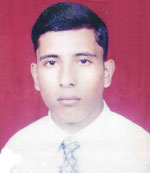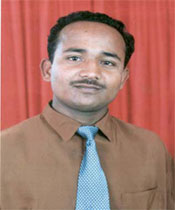Related Links
Case Updates
Krishna Adhikari
 On 6 June 2004, Krishna Prasad Adhikari, a resident of Fujel village of Gorkha District, was murdered in Chitwan District by Maoist cadres. Krishna Prasad was visiting his grandparents after having taken the SLC examinations, and he was abducted from Bakullahar Chowk by men who came on a motorcycle ...
On 6 June 2004, Krishna Prasad Adhikari, a resident of Fujel village of Gorkha District, was murdered in Chitwan District by Maoist cadres. Krishna Prasad was visiting his grandparents after having taken the SLC examinations, and he was abducted from Bakullahar Chowk by men who came on a motorcycle ... Maina Sunuwar
 Around 6 am on February 17, 2004, a group of RNA soldiers arrested Ms
Maina Sunuwar, a 15-year-old schoolgirl of Kharelthok VDC-6, Kavre
district. She disappeared since her arrest. Her family members, with
support from villagers and school where Maina was a student, visited
detention centers ...
Around 6 am on February 17, 2004, a group of RNA soldiers arrested Ms
Maina Sunuwar, a 15-year-old schoolgirl of Kharelthok VDC-6, Kavre
district. She disappeared since her arrest. Her family members, with
support from villagers and school where Maina was a student, visited
detention centers ... Sanjeev Kumar Karna
 Sanjeev Kumar Karna was one among the 11 persons arrested on October 8, 2003. On that fateful day, they had gone to attend a picnic program organized by the students at a place called Kariyachauri VDC-4, and from picnic, they went to Kataiya Chowri Area of Dhanusha district where they ate some food ...
Sanjeev Kumar Karna was one among the 11 persons arrested on October 8, 2003. On that fateful day, they had gone to attend a picnic program organized by the students at a place called Kariyachauri VDC-4, and from picnic, they went to Kataiya Chowri Area of Dhanusha district where they ate some food ... Arjun Bahadur Lama
Hari Prasad Bolakhe
Sarala Sapkota
Birendra Shah
Bishwanath Parajuli, Tom Nath Poudel and Dhan Bahadur Tamang
Chot Nath Ghimire and Shekhar Nath Ghimire
Bhauna Tharu
AF and ICJ Convened Consultation with Stakeholders on Reparations
The consultation aimed to strengthen policy frameworks on reparations, drawing insights from civil society organizations (CSOs), conflict victims, legal experts, and media representatives.
During the consultation Laxmi Pokhrel, National Legal Advisor at the ICJ, underscored the pressing need for unified reparation policy frameworks amidst existing disparities, emphasizing the challenges faced by victims of torture and sexual violence who have been overlooked in government initiatives.
Dr. Mandira Sharma, Senior International Legal Advisor at the ICJ, shed light on Nepal's transitional justice process, emphasizing the lack of a cohesive understanding of reparation. She highlighted concerns surrounding the reparation at the national and provincial levels.
Melissa Upreti, Regional Director of the Asia Pacific Program at the ICJ, emphasized victim-centric approaches in reparation efforts, stressing the importance of resource allocation and tailored support mechanisms to meet individual needs.
Srijana Shrestha, Chairperson of Conflict Victim Women National Network, presented insights into victims' experiences in accessing reparation, urging for an expanded definition of victims and addressing challenges such as confidentiality and data collection methods.
Raju Chapagain, Advocate, delved into framing an integrated reparation policy, highlighting the necessity for collaboration among provincial governments and victim groups to ensure comprehensive measures.
The consultation also featured group discussions and presentations, with stakeholders providing valuable input on past relief efforts, policy scope, victim prioritization, inter-governmental cooperation, victim identification, and measures to ensure accountability and transparency in implementation.
Notable recommendations included establishing specialized mechanisms for victims of conflict-related sexual violence, ensuring budget planning clarity, victim-centric approaches, disintegrated data collection, and empowering civil society. The consultation underscored a collective commitment to address transitional justice challenges, paving the way for informed policy frameworks that uphold victims' rights and facilitate meaningful reparation processes.
























Join Us